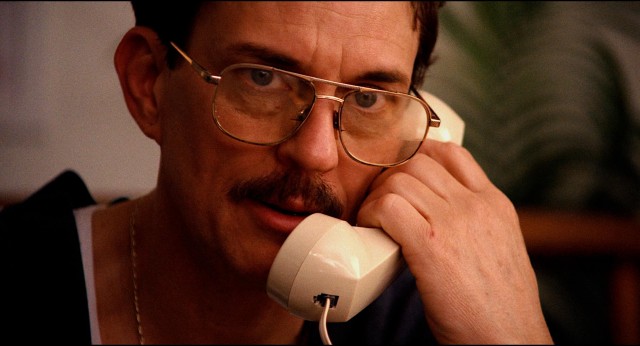The monoculture of the post-mass-media but pre-internet society feels positively alien sometimes when looking back. The instigating event of Sam Benenati’s new short film, a made-for-TV movie that dramatizes nuclear war, really did air on US television in 1983. And it really did cause hysteria—with counselors manning 1-800 hotlines throughout the program and 100M people tuning in live. Carl Sagan debated Henry Kissinger on TV afterward and President Reagan was quoted as saying the film “…left me greatly depressed.” While it has largely faded from cultural memory, its existence as a massive shared experience was notable enough for a feature documentary on the phenomenon to premiere at DocNYC in 2020. For no small portion of those 100M viewers, it was a graphic and triggering reminder of their mortality.
That is its effect on Frank (Brian DeMarco), the protagonist of today’s short, The Day After The Day After. Interviewed by local television after watching the film, Frank is noticeably disturbed—the repercussions and ramifications of what he’s seen spinning through his head, visibly upsetting him. He heads home, snorts a line, smokes a cig, and begins flipping through his Rolodex—thoughts of the end of the world leading him, inexorably, to thoughts of lost love.
The writer/director of this film, Sam Benenati, does not truly care about the 1983 made-for-TV movie The Day After or its cultural legacy, but latching onto a nostalgic event does serve as an intriguing hook for his sometimes spartan short, and as clever shorthand for communicating Frank’s distressed headspace. This allows Benenati to then dive into what he does best, which is direct amazing performances from actors. It’s a skill he does as well as anyone in Short Film.

Brian DeMarco stars as Frank. Describing the intimate approach the film fosters, Benenati notes, “…hopefully, you’d forget the person he’s talking to is not actually in the room with him.”
Benenati’s talent in this regard has been proven across three prior Short of the Week selections, all phenomenal acting showcases. In the last two, Emily and Red Light, he has forgone much support from locations, production design, or even other actors, filming exquisitely captivating monologues that are still, somehow, “cinematic”. The Day After The Day After pays slightly more heed to conventional filmmaking, as the short features strong period touches in its costuming, props, and even music (in a charming move, Benenati employs genuine 80s songs from his Father’s old band). But, huge chunks of the film are DeMarco, by himself on an island, armed with little more than the script and an old land-line telephone. Hopefully, it’s not a spoiler to say that the man simply cooks. It’s not a flashy performance, but it is massively absorbing and, by the end of the film’s 11 minutes, massively moving.
Red Light was the last time we featured Benenati and it is still a personal favorite, as he collaborated with Jen Tullock to craft a humorous and absurdist piece that highlights the range and manic presence of its star. But, while its minimal, actor-centric approach is familiar, The Day After The Day After operates in an entirely different emotional register. “I wanted to be unapologetically earnest, sincere, and big, emotionally,” the director explains, “I didn’t want to be meta or tongue-in-cheek, I wanted to experiment with sentimentality as opposed to just being afraid of it.” Frank transforms from a somewhat cocky but affable figure at the start of the film to a nakedly vulnerable one, and the clever script is perfectly modulated to invite audiences to fill in the missing contextual gaps—not too expository, not too withholding—so we readily and willingly participate in populating Frank’s backstory with absent detail.
DeMarco’s performance plays a big role in our willingness and he deserves his flowers. But, the fact that Benenati can consistently pen and film scripts that are monologues or two-handers yet leave viewers on the edge of their seats is truly phenomenal. Performances are part of it naturally and the writing is a huge chunk, but his direction should not be overlooked. Benenati elaborates on his approach here, explaining, “Even though we are in Frank’s apartment for the majority of the film, the intent was to create an atmosphere that feels unapologetically epic, intimate, and earnest. Like Cassavetes by way of Douglas Sirk.” Alongside his DP, Jacob “Kuba” Bojsza, he has an incredible feel for when to go in for a closeup and here he masterfully deploys slow pushes and pull-outs in accordance with the tension and emotional tenor of the scene. More than simply camera decisions too, Benenati understands how to direct his actors. He is a master at, what out of ignorance I’ll call the “negative space” of a performance, which is coaxing the proper pauses and looks that break and inflect the line deliveries and explicit gestures. Emerging directors would do well to review his filmography to see if they can decipher the instincts at work.
While that filmography is sizable, if things go to plan, fans of Benenati will soon have a larger canvas on which to examine his work. While the sometimes enigmatic LA-based filmmaker director was withholding of details, he tells us that he is planning to shoot his feature debut in the Fall.

 Jason Sondhi
Jason Sondhi